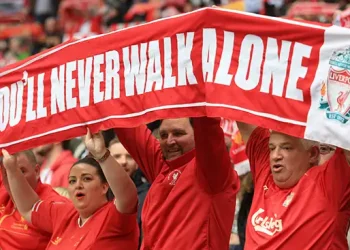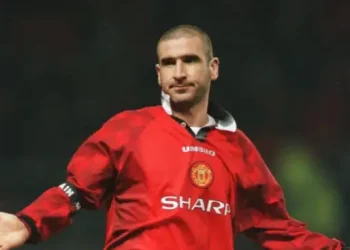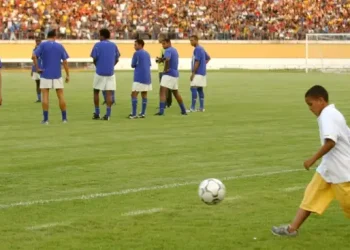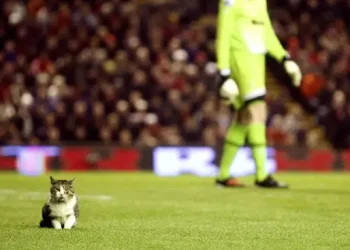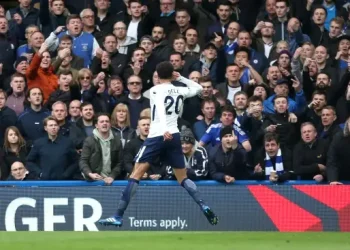Football thrives on fine margins. One goal, one decision, or one bad haircut can change everything. And while every fan knows the agony of a last-minute winner going against them, some moments don’t just decide a match – they shape the very future of clubs, managers, and even entire leagues.
What if that penalty had gone in? What if that shot had gone wide? What if a billionaire had picked a different stadium to visit?
Here are eight of the greatest “what if” moments in football – pivotal points in history where the game teetered on the edge and came out the other side looking very, very different.
Jesper Gronkjaer – The £140 million goal
In 2003, Russian billionaire Roman Abramovich was football-curious. He had money to spend and a growing obsession with the Champions League. On the final day of the 2002–03 season, Chelsea hosted Liverpool in what was essentially a Champions League qualification playoff. Lose, and Liverpool take the spot. Win, and Chelsea edge them out.
Liverpool took the lead early, but Marcel Desailly pulled one back. Then came the moment. Jesper Gronkjaer curled in a now-famous winner, sealing Chelsea’s place in the top four.
Abramovich watched it all and was sold – literally. Days later, he bought the club for £140 million. The rest? A Champions League trophy, multiple league titles, and about 27 different managers later, Chelsea became one of the biggest clubs in Europe.
Without that goal, Chelsea might still be hanging out with Fulham.
Leyton Orient – A penalty shootout, a broken dream
In 2014, Leyton Orient were 90 minutes away from the Championship. They reached the League One play-off final and went 2-0 up against Rotherham, dreaming of a return to second-tier football.
But Rotherham fought back, levelled it at 2-2, and then crushed Orient hearts in a penalty shootout.
The next season, Orient fell to League Two. By 2017, they had dropped out of the Football League completely after 112 years. Off-pitch financial chaos followed, and they finished 13th in the National League in 2017–18.
If those penalties had gone the other way, Orient could have been rubbing shoulders with Leeds and Derby. Instead, they were fighting just to stay afloat.
Sir Alex Ferguson – The sliding door that nearly shut
In the winter of 1990, Sir Alex Ferguson was not the knighted, legendary figure we know today. He was a manager under siege. Manchester United had gone seven games without a win, and a string of poor results had fans and board members alike questioning whether he was the man for the job.
They drew Nottingham Forest in the third round of the FA Cup – and most people expected another United flop.
But up stepped Mark Robins, scoring a vital winner. United went on to win the cup that season, lifting the pressure and giving Fergie the time he needed to build his dynasty.
Former chairman Martin Edwards later insisted, “He would not have been sacked if we had lost,” but also admitted, “There was a lot of pressure to make a change.”
If Robins doesn’t score, do United win the FA Cup? If they don’t win the cup, does Ferguson survive? If he doesn’t survive, do they ever become the dominant force of the Premier League era?
Probably not. And that changes everything.
Dennis Bergkamp – One penalty, one treble, one haunting memory
The year is 1999. Arsenal and Manchester United are neck-and-neck in the Premier League and now face off in a pulsating FA Cup semi-final replay.
With the score at 1-1, Roy Keane gets sent off, and Arsenal are awarded a last-minute penalty. Up steps Dennis Bergkamp – already a scorer in the match – to potentially end United’s treble dream.
Peter Schmeichel dives the right way and saves it.
Moments later, Ryan Giggs embarks on that run, weaving past half of Arsenal’s team before smashing the ball into the roof of the net. United win, then go on to claim the Premier League, FA Cup, and Champions League.
“That miss was one of the biggest blows in my career,” Bergkamp later admitted. “Football is a game of moments. If I score the penalty, they probably don’t win the treble. That made it their season.”
Leeds United – Close to the top, then crash to the bottom
In 2006, Leeds were on the up again. Under Kevin Blackwell, they made it to the Championship play-off final and had a shot at Premier League promotion.
Watford had other ideas. They hammered Leeds 3-0 in Cardiff and sent the club spiralling.
The very next season, Leeds were relegated to League One for the first time in their history. Financial mismanagement followed, and it would be years before they found their way back to the top flight.
That one final felt like a fork in the road. One path led to the Premier League. The other led to chaos. Unfortunately for Leeds, they took the second one.
Bayer Leverkusen – The nearly team that stayed nearly
Between 1997 and 2002, Bayer Leverkusen were Germany’s eternal runners-up. Four second-place finishes in five years, each one more painful than the last.
Then came the 2001–02 season – the infamous “Treble Horror.” They lost the Bundesliga title on the final day. They lost the DFB Pokal final. And then, in the Champions League final, Zinedine Zidane scored one of the most iconic volleys of all time to beat them 2-1.
The collapse was brutal. Ze Roberto and Michael Ballack left for Bayern Munich, and the club narrowly avoided relegation the next season.
What if Zidane had shanked that volley into Row Z? What if Leverkusen had won one – just one – of those finals? Their entire legacy could have been rewritten.
Mark Hughes – One goal, many consequences
In 1994, Oldham Athletic were just minutes away from the FA Cup final. They led Manchester United 1-0 in the semi-final and were dreaming of Wembley.
Then came Mark Hughes with a devastating late equaliser. United won the replay and went on to lift the trophy. Oldham never recovered.
They failed to win another game that season, were relegated from the Premiership, and the decline began. After years of struggle, they were relegated to League Two in 2018 – their lowest finish since 1971.
Hughes’ goal was the spark. Without it, Oldham’s future might have looked very different.
Paul Dickov – The goal that changed everything for Manchester City
In 1999, Manchester City were in the third tier. Yes, really. They faced Gillingham in the Division Two play-off final and were trailing 2-0 with just moments to go.
Kevin Horlock pulled one back in the 90th minute. Then Paul Dickov smashed in a dramatic equaliser in stoppage time to send the game to penalties. City held their nerve and won the shootout.
It was their only ever season in the third tier. The next year, they were promoted again. And just a few seasons after that, they were back in the top flight.
Today, they are one of the most dominant clubs in world football. But without that Dickov goal, there is no Etihad era, no Pep, no Aguero moment.
Meanwhile, Gillingham eventually went up the following year, but have been stuck bouncing between League One and League Two ever since.

